Mind Games: Boost Your Brainpower with Engaging Puzzles
Updated On: October 26, 2025 by Aaron Connolly
What Are Mind Games?
Mind games push your brain to think in new ways and help you get sharper. They go from easy puzzles to deep strategy games that make you use your memory, logic, and problem-solving muscles.
Definition and Purpose
People use mind games as brain workouts. You’ll find everything from classic puzzles like crosswords and Sudoku to slick new brain training apps and old-school board games that demand strategy.
These brain games keep you sharp as you get older. They’re fun, but they also help you build up mental skills at the same time.
Quick win: Try just 10 minutes of brain games each day. No need to jump into hour-long marathons.
The main idea? Boost your cognitive function by making mental exercise a habit. Studies say regular practice can help you focus better and think faster.
Different mind games work on different skills:
- Memory games help you get better at remembering things
- Logic puzzles make you reason through problems
- Word games stretch your vocabulary and language skills
- Maths puzzles get you thinking with numbers
Cognitive Skills Involved
Mind games hit several mental skills at once. Memory really matters, whether you’re remembering Sudoku grids or keeping chess moves in your head.
Working memory lets you hang onto info as you solve problems. Puzzles and pattern games also tap into your visual-spatial skills.
How fast you can process info affects how quickly you finish these games. Your attention and focus decide if you can stick with tricky problems or get distracted.
Problem-solving means pulling together lots of skills to crack a challenge. If your first plan doesn’t work, executive function helps you switch gears.
Different games focus on different things:
- Chess is all about strategy
- Brain games like Lumosity push your processing speed
- Crosswords stretch your language brain
- Number puzzles sharpen your math logic
Brief History of Mind Games
Mind games go way back. Chess started in India around the 6th century. Even ancient civilizations had word puzzles.
The first modern crossword puzzle popped up in 1913. Sudoku became huge in Japan in the 1980s and then took off everywhere.
People started making digital brain training programs in the early 2000s. When mobile apps arrived, suddenly you could play anywhere.
The phrase “mind games” in psychology showed up in 1963. But honestly, people have used brain teasers as learning tools for a lot longer than that.
Lately, scientists have dug into how well brain training works. Game designers now use neuroscience to make these games even smarter.
Today’s mind games mix fun with research-backed brain training.
Types of Mind Games
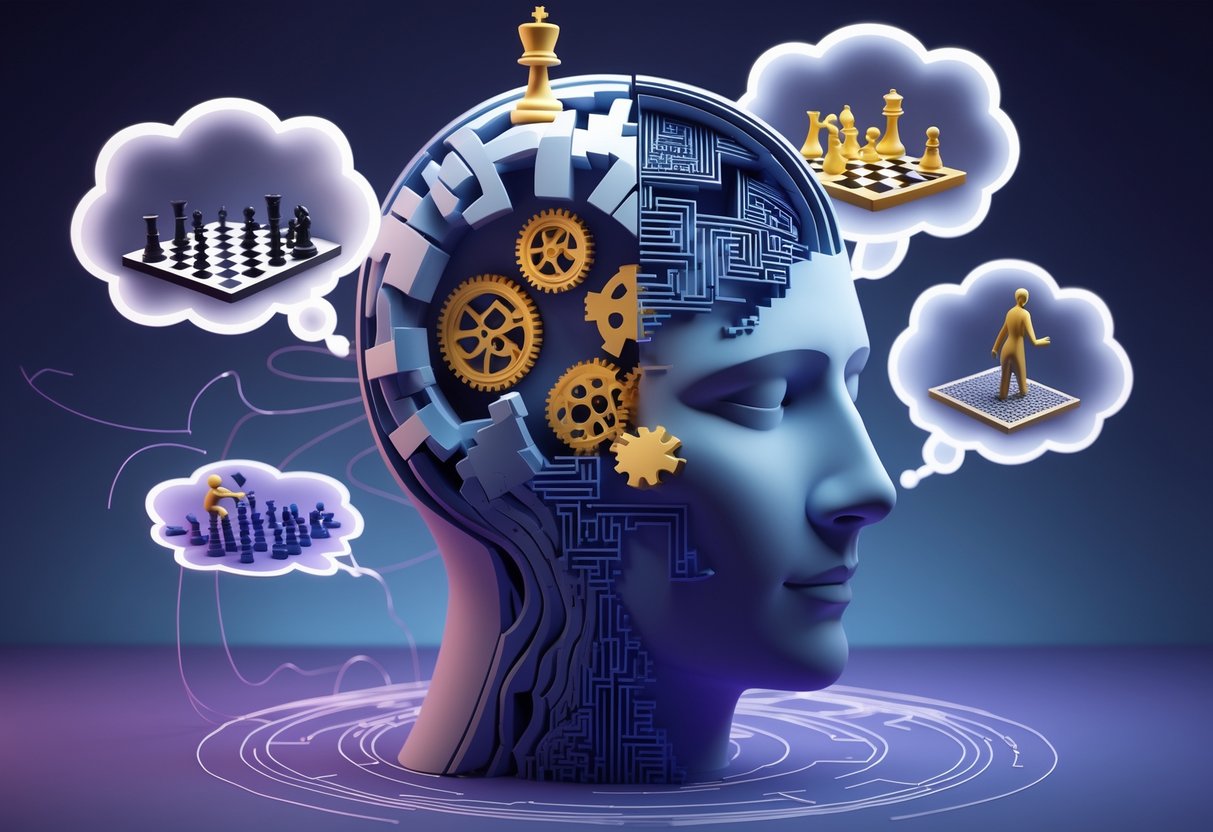
Mind games usually fit into four big categories. You’ve got logic puzzles for reasoning, memory games for recall, maths games for number skills, and pattern recognition games for visual thinking.
Logic Puzzles
Logic puzzles make you think through problems step by step. You can’t just guess—you need to reason it out.
Sudoku is a classic logic puzzle. You fill a 9×9 grid with numbers 1-9, making sure each row, column, and box gets just one of each.
Crosswords mix logic with word smarts. You use clues to find words that fit together.
Chess pushes you to plan and think several moves ahead. Each piece moves its own way, so you’ve got to keep track.
Logic puzzles help you get better at problem-solving and thinking things through. They teach you to break down tricky problems into smaller steps.
You can find tons of logic puzzles online or in books. Start easy and move up as you get better.
Memory Games
Memory games help you remember and recall stuff faster. They train different types of memory, depending on the game.
Card matching games work your visual memory. You flip cards over and try to remember where each one is.
Number sequence games make you repeat longer and longer strings of numbers. That’s great for building working memory.
Name and face games push you to match people’s names with their faces. That’s actually super useful in real life.
When you play memory games, your brain builds stronger connections. If you practice regularly, you’ll notice your memory getting sharper.
You can grab digital memory games on your phone or computer. Most are free and let you track your progress.
Short, regular sessions work best. You don’t need to play for hours.
Maths Games
Maths games mix number problems with fun gameplay. They help you get better at mental math and logical thinking.
Mental arithmetic games test how fast you can solve sums in your head. You’ll see addition, subtraction, multiplication, and division.
Number puzzles like KenKen use basic math to fill in grids. You need to make the numbers in each section add up the right way.
Probability games teach you about odds and statistics. You learn to make smart choices based on what’s likely.
Geometry puzzles mix shapes, space, and numbers. You might need to work out area, angles, or spot patterns.
If you practice maths games, numbers start to feel more natural. You get quicker and more confident.
Many maths games adjust their level to match your skills, so you always get a good challenge.
Pattern Recognition Games
Pattern recognition games train you to spot visual patterns and sequences. They help you see connections and guess what comes next.
Nonogram puzzles use number clues to reveal hidden pictures. You figure out which squares to fill by following patterns in the rows and columns.
Sequence completion games show a series—shapes, colors, or numbers—and you have to find what’s missing. It’s about spotting the rule.
Visual puzzles give you tricky images to scan for differences, hidden objects, or repeated shapes.
Tile-matching games push you to group similar patterns fast, often against the clock.
These games make you faster at processing visual info and better at noticing details. You start spotting patterns everywhere, not just in games.
Pattern recognition helps with reading, driving, and solving real-life problems too.
Memory Games for Sharpening Recall
Memory games target specific brain skills with challenges that strengthen your neural pathways. These exercises work on your short-term memory, boost visual recognition, and help you link words and numbers in your mind.
Improving Short-Term Memory
Short-term memory only holds info for about 15-30 seconds. You can boost it with games that make you remember things quickly.
Sequence Memory Games are great for this. Simon, the old-school electronic game, flashes a pattern of lights and sounds. You copy the sequence, and each round adds another step.
Digit Span Exercises ask you to remember longer and longer strings of numbers. Start with three digits and see if you can work up to seven or eight.
Card concentration games help too. You flip over pairs of cards and try to remember where everything is. It’s a workout for both visual scanning and recognition.
Quick Win: Set a timer for five minutes a day and do digit span drills with a random number generator online.
Visual Memory Exercises
Visual memory games help you remember what you see. These games boost your spatial skills and make it easier to remember faces, places, and patterns.
Grid Memory Games show you a pattern of objects or symbols in a grid. After you look for a few seconds, you try to recreate it from memory. Start with a 3×3 grid and build up.
Face-Name Association Games give you photos and names to study. Later, you try to match them up in a quiz. There are plenty of these online.
Pattern Recognition Activities show you complicated patterns with shapes, colors, or symbols. You have to spot and remember them, which really works your visual brain.
Spot-the-difference games are simple but effective. You compare two images and find tiny changes. It’s good for sharpening your eye for detail.
Word and Number Memory
Mixing words and numbers makes for some tough memory challenges that feel a lot like real life. These games help you remember phone numbers, names, and addresses.
Word Chain Games have you remember sequences of related words. Try categories like animals or colors, then move to random lists. Each round, add more words.
Number Pattern Games give you math sequences to finish from memory. They blend logic and short-term memory, which is a double win for your brain.
Verbal-Visual Association games pair words with images or places. The method of loci trick uses familiar spots—like rooms in your house—to help you remember lists.
Dual N-Back Training is a tough one. You keep track of spots on a grid while also remembering spoken letters. It’s a serious workout for both your visual and auditory memory.
Warning: Don’t try to play every memory game at once. Pick two or three and stick with them for a while to see real results.
Popular Puzzle Classics
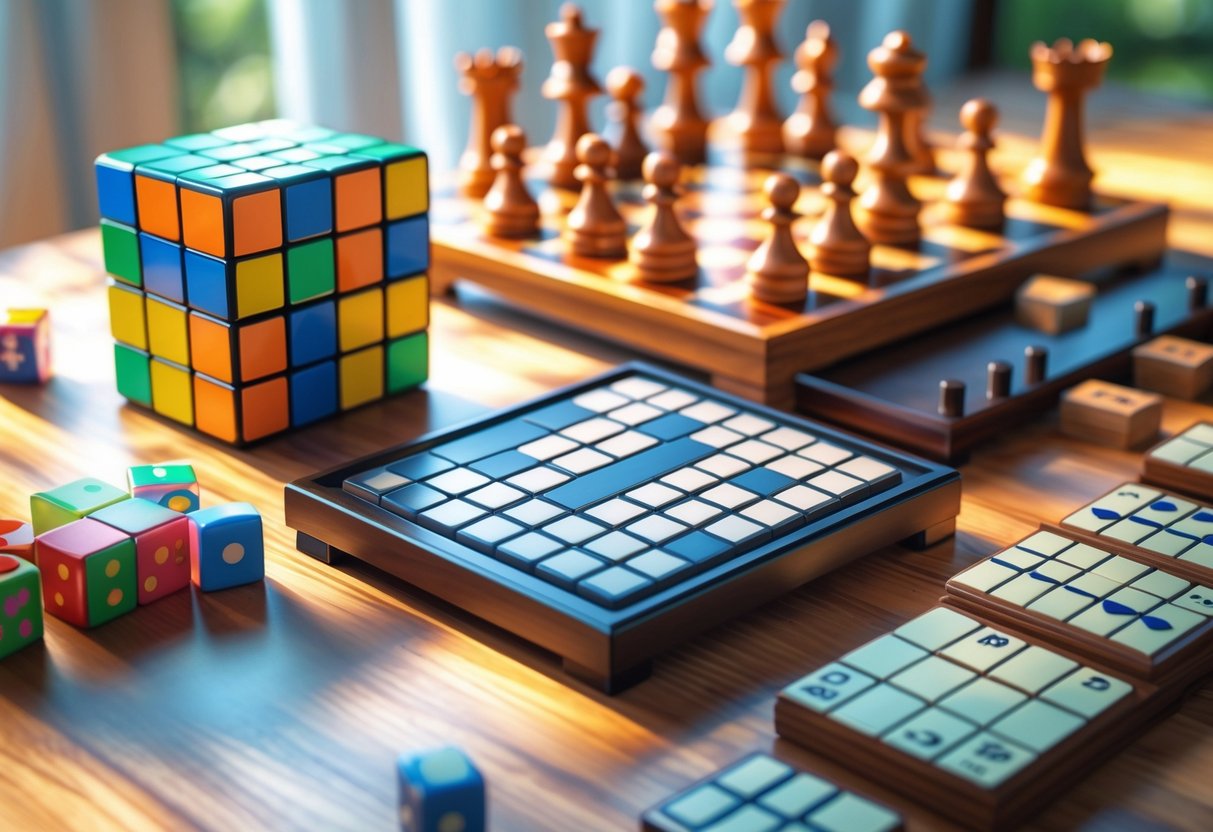
Classic brain games have kept people hooked for decades. Each one calls for its own tricks and techniques, and if you practice, you’ll get faster and smarter at solving them.
Nonogram Strategies
Nonograms mix logic and art. You fill in grid squares based on number clues to reveal a hidden picture.
Start with the biggest numbers in each row and column. Those give you clues right away. If a row says “8” and there are 10 spaces, you know the middle 6 have to be filled.
Look for definite squares first. When the numbers almost add up to the total spaces, you can fill in some squares for sure.
Try the overlap method for big numbers. A “7” in a 10-space row only fits three ways, but the middle squares always overlap.
Cross-reference between rows and columns a lot. What you solve in one direction usually helps with the other. Use Xs to mark squares you know are empty so you don’t get mixed up.
Work on completed lines early. Once you finish a row or column, it gives you a solid base for solving the rest.
Sudoku Techniques
Sudoku is all about pure logic—no guessing if you do it right.
Scan for singles first. If a number can only go in one spot in a row, column, or box, fill it in.
Use pencil marks to keep track of what might fit in each empty cell. Write small numbers in the corners to help you remember.
Look for naked pairs. If two cells in a row or box can only be the same two numbers, you can remove those numbers from other cells in that area.
Hidden singles pop up when a number only fits in one place in a box, even if that cell has other options.
Try box-line reduction. If a number in a box can only go in one row or column, you can rule it out from those spots outside the box.
If you’re up for a challenge, practice X-wing patterns. When a number lines up in a rectangle across rows and columns, you can eliminate that number elsewhere.
Crosswords and Word Games
Crosswords mix up vocabulary skills, pattern recognition, and a dash of clever wordplay.
I always fill in short words first—those 3-4 letter answers give you crossing letters that make the longer ones way easier.
If you notice a theme in a puzzle, latch onto it. Once you spot it, the rest of the theme answers just sort of fall into place.
You’ll see common crossword words all the time. Words like “OLIO” (miscellany), “ARETE” (sharp ridge), and “ESNE” (Anglo-Saxon serf) pop up everywhere, so it’s worth learning them.
Word endings can be dead giveaways. Look for “-ING,” plural “-S,” or “-ED” endings to help narrow things down.
I like using a crossing strategy—work those intersecting answers together. If you’re stuck on one clue, try building up the letters from the crosses.
Watch for question marks in clues. That usually means puns, wordplay, or something non-literal is going on, so you’ll need to get creative.
Math Games for Logical Thinking
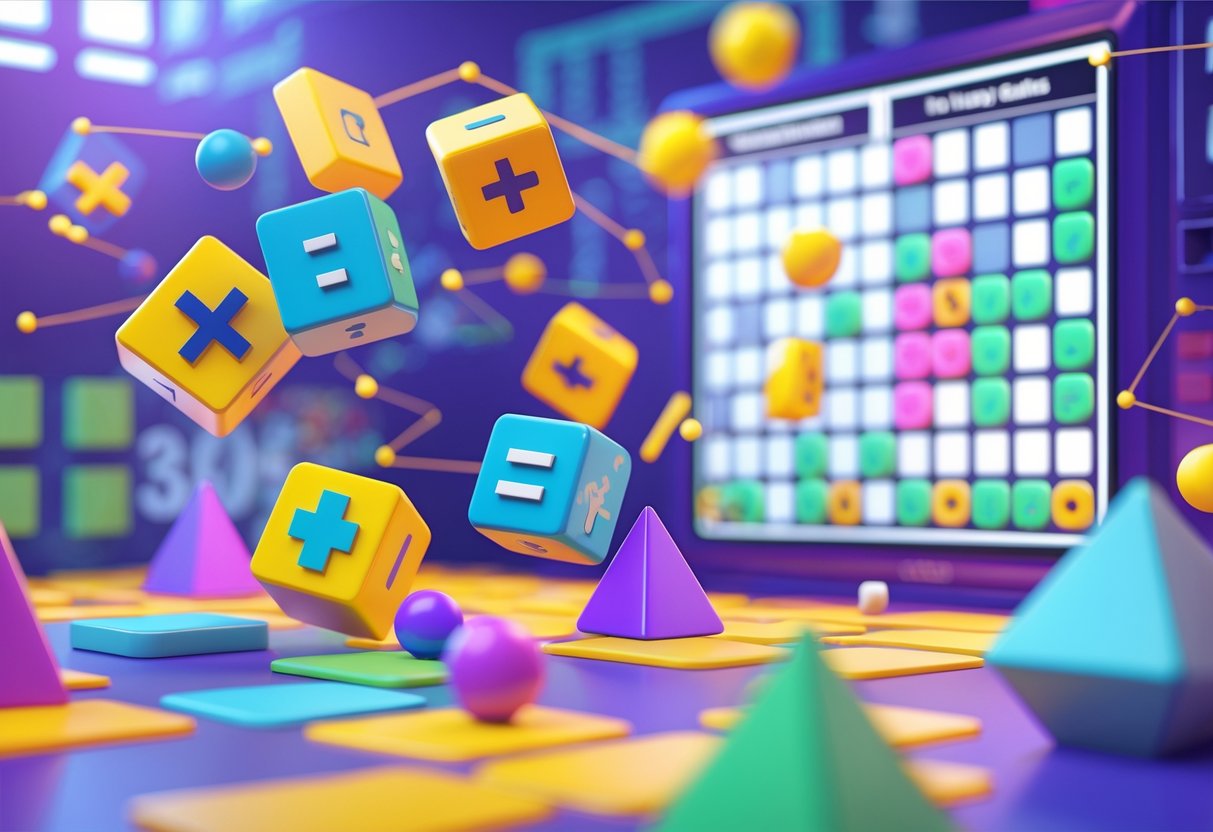
Math games bring together number skills and strategic reasoning. They help you boost your processing speed and develop a more systematic approach to problem-solving through arithmetic, pattern spotting, and logical deduction.
Mental Arithmetic Challenges
Mental arithmetic games push your brain to handle numbers fast—no calculators, no paper. You’ll focus on addition, subtraction, multiplication, and division, usually with a timer ticking away.
Speed-based arithmetic really ramps up your processing speed. Start with basic two-digit sums, then try more complicated, multi-step calculations. Most online platforms let you tweak the difficulty as you get better.
You’ll see formats like:
- Timed rounds (30 seconds to 2 minutes)
- Levels that get harder as you go
- Mixed operations that keep you on your toes
I’d say try 5-minute daily sessions. Track your accuracy, not just speed—being fast doesn’t help if you’re wrong.
Quick tip: Use apps that show your progress over time. Watching your calculation speed improve is honestly pretty motivating.
Number Sequencing Puzzles
Number sequences test your ability to spot patterns and predict the next number. These puzzles really build up your logical reasoning.
You’ll run into sequences like arithmetic progressions (adding the same number), geometric progressions (multiplying by a factor), or Fibonacci-style patterns. Trickier puzzles might mix different rules together.
Some advanced sequences use:
- Prime numbers or constants
- Alternating operations
- Position-based rules (odd and even spots do different things)
Best way to practice: Begin with easy ones like 2, 4, 6, 8… then move up to tougher ones like 1, 4, 9, 16… (those are perfect squares, by the way).
Puzzle books and websites have loads of sequence challenges. I’d try doing 3-5 a day—enough to build skill but not so many that your brain melts.
Math-Based Problem Solving
Strategic math games make you plan ahead while working within certain number rules. These games mix math know-how with logical decision-making.
You’ll find:
- Number placement puzzles (like Sudoku)
- Calculation-based strategy games
- Resource management games with a math twist
Playing these games can:
- Sharpen your logical reasoning through multi-step problems
- Improve your planning by making you consider different solution paths
- Boost your number sense by exposing you to lots of mathematical relationships
Don’t jump into advanced puzzles right away. Get comfortable with basic logic games first.
Start with games that explain the rules clearly and offer hints if you get stuck. Building confidence on easier problems sets you up for tougher challenges later.
Difficulty Levels and Progression

Mind games adjust to your skill level with smart difficulty systems, so you stay challenged without getting overwhelmed. Most games let you pick your settings and track your progress, creating a more personal learning curve.
Understanding Game Levels
Most mind games have three to five difficulty levels, so you can find your sweet spot. Easy modes help you get the hang of things without much stress. Normal is good for regular practice.
Hard and Expert really test you with complex puzzles and less time to think. Some games use dynamic difficulty that adapts to how you’re playing, not just what you pick at the start.
The best games roll out new ideas gradually. Maybe you start with matching tasks, and then they add time limits or extra colors. That way, you build skills without getting frustrated.
Many brain training apps use adaptive algorithms. They watch your reaction times and accuracy, then find the right challenge level for you.
Customising Challenges
Modern mind games let you tweak difficulty in more ways than just easy or hard. You can usually adjust time limits, puzzle complexity, or even add visual distractions.
Quick win: Try shorter time limits before making puzzles harder—confidence builds fast that way.
Some games have accessibility options, like bigger text, high-contrast colors, or audio cues if you prefer sound over visuals.
Multiplayer games often use handicap systems. Beginners might get extra time or fewer obstacles, so everyone can have fun.
Heads up: Don’t rush into higher difficulty. It’s frustrating and can make you want to quit.
Try making custom goals like “solve 10 puzzles in a row without mistakes” instead of just moving up a level.
Tracking Your Progress
Most good mind games give you detailed progress tracking. You’ll see stats like accuracy, average completion time, and streaks for getting answers right.
Progress charts can show where you shine and where you need work. Maybe you’re awesome at memory games but struggle with spatial puzzles.
A lot of apps send weekly or monthly reports so you can see how you’re doing over time. It’s helpful for staying motivated, especially when improvement feels slow.
Daily streaks encourage you to play consistently. Even five minutes a day beats one long session every now and then.
Some games unlock badges or new puzzle types as you get better. Those little rewards make it more fun than just chasing a high score.
Hand-Eye Coordination and Perception
These mind games help your brain process visual info fast and guide your hands with precision. You’ll build quicker reflexes through reaction challenges and get better at spotting key details with scanning exercises.
Reflex and Reaction Time Games
Aim trainers are probably the best way to work on hand-eye coordination. These games throw targets on the screen and you click them as fast as you can.
Kovaak’s FPS Aim Trainer (£8.50) and Aim Lab (free) are both popular. They track your progress over time, measuring reaction speed and accuracy.
Ball toss games are great if you want something offline. Just throw a tennis ball at a wall and catch it. Start close, then move back as you improve.
Try to practice 10-15 minutes a day. Short sessions build muscle memory without tiring you out. Lots of esports players use aim trainers to warm up before matches.
Light reaction panels are another option. They flash random colors or patterns, and you tap the right ones as quickly as you can.
Visual Scanning Drills
Target tracking exercises teach your eyes to follow moving things smoothly. Online games have dots or shapes moving around, and you try to keep your cursor right on them.
These drills help you track enemies in fast games and keep up with lots of info at once.
Pattern recognition games push you to spot differences or hidden objects. Start simple, then try harder ones as you get better.
Visual scanning skills are a big deal in competitive gaming. You need to watch several parts of your screen at the same time—enemy moves, resources, maps, all of it.
Peripheral vision training is also useful. Some exercises flash targets at the edges of your screen while you focus in the center. This boosts your awareness without losing sight of what’s in front of you.
Processing Speed and Quick Thinking

Processing speed lets you react quickly in high-pressure games and make split-second decisions. Certain puzzle games and attention drills can really sharpen your mental reflexes for competition.
Timed Puzzles
Quick reaction puzzles push your brain to process info fast. You’ll have to solve problems before the clock runs out.
Sudoku with timers is a good one—try to finish an easy puzzle in 10 minutes, then work your way down to 5.
Speed crosswords test how fast you can recall words. Start with 5×5 grids and see if you can finish in under 3 minutes.
Pattern matching games like Spot It ramp up the speed each round, so you get faster at spotting similarities.
Math puzzles with countdowns force you to solve arithmetic problems in under 30 seconds each.
Racing against the clock feels a lot like real competition. Your brain learns to pick out what matters and ignore the rest.
Attention and Concentration Boosters
Focus training games help you stay sharp during long sessions. These games build your ability to pay attention for longer stretches.
Memory card games make you remember locations while new info keeps coming at you. Start with 8 cards, then add more as you improve.
Multi-tasking puzzles are tricky—you might be counting backwards from 100 while solving word problems.
Visual tracking exercises work on following fast-moving things on the screen. Online reaction tests measure how quickly you respond to color shifts or movement.
Breathing-based games combine mental challenges with slow, steady breathing. This helps you stay calm and focused during tense moments.
Dual N-Back training is tough but effective. You have to remember sequences while new ones come in. It’s a direct way to boost working memory and processing speed for game situations.
Benefits of Playing Mind Games
Mind games do more than just pass the time—they really improve how your brain works and help you unwind from daily stress. Studies show these activities boost memory and processing speed while giving you a mental break from life’s pressures.
Cognitive Enhancement
Mind games are basically a gym for your brain. They challenge all sorts of mental skills, and you get better the more you practice.
Memory gets a boost when you play puzzles or strategy games. Your brain starts storing and recalling info faster. People who play brain games regularly remember details better—science backs that up.
Processing speed goes up as you tackle fast-paced challenges. Games that force quick decisions train your brain to think on its feet. That’s handy in real life, too.
Perception sharpens with games testing your visual and spatial awareness. Pattern recognition games help you catch details most people miss. Your brain just gets better at sorting out complex info.
Different games target different skills:
- Sudoku: Number logic and problem-solving
- Memory matching: Short-term recall and focus
- Word puzzles: Language and vocabulary
- Strategy games: Planning and decision-making
Playing even 20 minutes, three times a week, can make a real difference. You’ll notice a longer attention span and better focus if you keep it up.
Stress Relief and Relaxation
Mind games give you a healthy way to escape work pressure and daily worries. They pull your attention into the moment, pushing stress to the side.
When you focus during gameplay, it works a lot like meditation. You’re concentrating on the puzzle, not your anxious thoughts. That break can really reset your mood and energy.
Solving puzzles brings a sense of achievement, and your brain actually releases feel-good chemicals. Beating a tough crossword or smashing a high score gives you a quick confidence boost that can last all day.
Playing with others or sharing scores online creates social connection. Competing in multiplayer brain games with friends or family helps fight off loneliness and strengthens relationships.
If you want to use mind games for stress relief, try these:
- Play during lunch breaks to refresh your mind
- Use puzzle apps while commuting on public transport
- Solve crosswords before bed to wind down
- Challenge colleagues to friendly brain game competitions
Pick games that actually feel fun for you. If you enjoy them, you’ll get much more stress relief than if you’re forcing yourself.
Tips for Choosing the Right Mind Games
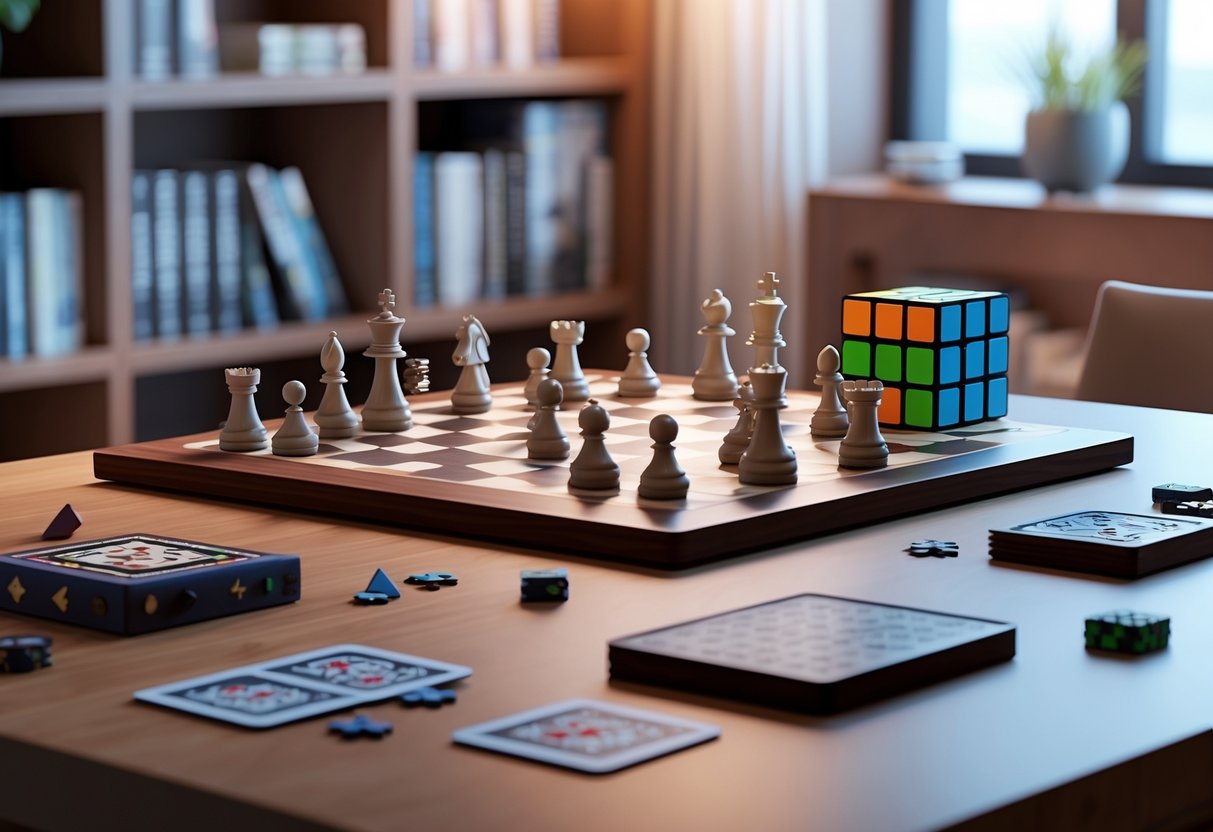
Finding the right mind games depends on your cognitive goals and experience. Match game types to the mental skills you want to improve, and make sure the difficulty fits your current level.
Matching Games to Skills
Different mind games target different abilities. Sudoku and other logic puzzles build analytical thinking and pattern recognition.
Memory games help you practice recall and boost working memory. Word games like crosswords can expand your vocabulary and strengthen verbal reasoning.
Strategy games such as chess sharpen your planning skills and foresight. Visual puzzles are great for spatial awareness and problem-solving.
Think about your daily struggles. If you have trouble focusing at work, try attention-based puzzles. If your memory isn’t what it used to be, go for recall challenges or sequence games.
Start with just one game type for a couple of weeks. That way, you’ll build confidence and a bit of routine before mixing things up.
Try mixing categories each week to keep your brain guessing. Maybe Monday is for logic, Wednesday is memory, and Friday is creative puzzles.
Age-Appropriate Recommendations
Young adults (18-30) usually like fast-paced, competitive games. Mobile brain training apps, speed puzzles, or multiplayer strategy games can match your energy and social vibe.
Adults (30-50) often want something balanced that fits a busy schedule. Crosswords, moderate Sudoku, or 15-20 minute brain training sessions during commutes or lunch breaks work well.
Older adults (50+) might prefer games that keep the mind flexible without being frustrating. Start with easier versions and move up slowly. Large-print puzzles are a lifesaver for tired eyes.
Don’t pick games that feel too childish or impossibly complex for your age group. You’ll probably just drop them.
If you have physical limitations, like arthritis, tiny mobile games might be tricky. Try large-print books or tablet games instead.
The best mind games should feel challenging but still doable. If you’re always frustrated or bored, tweak the difficulty instead of quitting.
Incorporating Mind Games into Daily Life

Bringing mind games into your daily routine can really help your memory, focus, and problem-solving skills stick around. The trick is to find a regular time and use tools that fit your lifestyle.
Building a Routine
Set aside 15-30 minutes a day for brain training. If you pick the same time every day, you’ll build the habit without thinking about it.
Morning is a great time for puzzles, before the workday chaos kicks in. Your mind is fresh and ready for a challenge.
Try these steps:
- Pick 2-3 game types (puzzles, word games, strategy)
- Start with just 10 minutes, then add more when it feels right
- Track your progress every week
- Mix things up to work different brain skills
Lots of people like to pair mental exercises with their regular habits. Maybe you do a crossword with your coffee or play a chess app during lunch.
Some quick wins:
- Set phone reminders for game time
- Keep a puzzle book in your bag
- Use waiting time for brain training apps
Switching up your games keeps things interesting and challenges new parts of your brain. Try memory games one day, logic puzzles the next, and something creative at the end of the week.
Online and Mobile Resources
Brain training apps make it super easy to play anywhere. Just grab your phone or tablet and you’re set.
Some top free platforms:
- Lumosity – Personalized training programs
- Peak – Quick 5-minute sessions
- Elevate – Focuses on practical skills
- Chess.com – For strategy and pattern recognition
Premium versions usually cost £5-15 a month and give you more detailed progress tracking and a bigger game library. Most apps let you try them out for free first.
Why mobile games work:
- Your progress syncs across devices
- Difficulty adapts to your skill level
- Social features let you compete with friends
- Offline modes are handy for travel or commutes
Try a few different apps to see which one feels right. Look for ones that adjust difficulty as you go and give clear feedback on your progress.
Watch out for apps that make wild claims about boosting your IQ or preventing dementia. Stick with evidence-based options that explain their methods.
Frequently Asked Questions
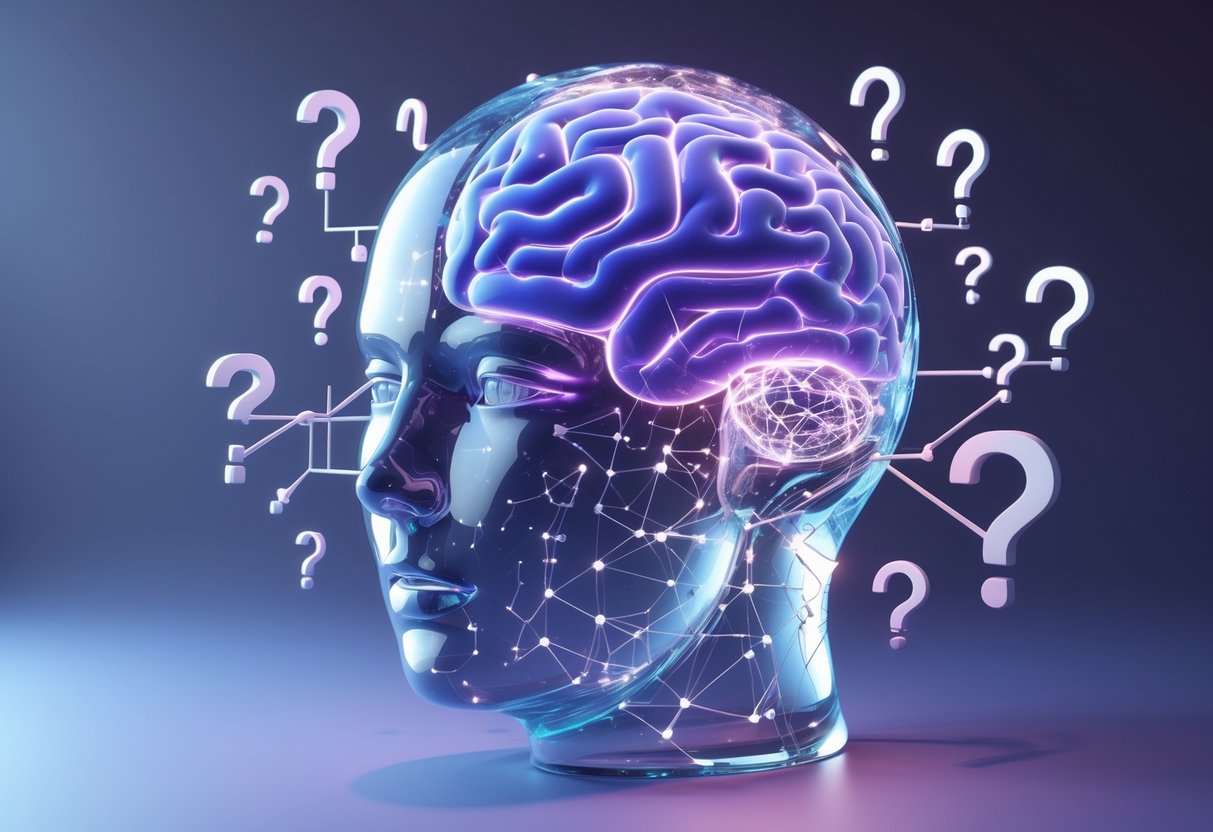
People often wonder about everything from classic brain teasers and strategy games to books, movies, and even music that messes with your mind. We’ve tossed in a few oddball picks too—like fragrances that supposedly capture the vibe of mental challenges.
What are some classic puzzles to challenge your cognitive skills?
Chess stands out for strategic thinking. You have to plan ahead and adapt to your opponent.
Sudoku trains your logical reasoning. Start easy, then work up as you get better at spotting patterns.
The Rubik’s Cube is a classic for spatial awareness and memory. With daily practice, most people can pick up the basics in a few weeks.
Crossword puzzles build vocabulary and lateral thinking. The Guardian and Times cryptic crosswords are tough, especially if you love a British challenge.
Bridge card games teach advanced strategic planning. Local clubs often run beginner sessions if you want to learn.
Could you recommend any books that delve into psychological manipulation techniques?
“The Art of War” by Sun Tzu dives into strategic deception. Business leaders love it for its competitive edge.
“Influence: The Psychology of Persuasion” by Robert Cialdini breaks down six persuasion tactics. If you want to know how people sway decisions, it’s a must-read.
“The 48 Laws of Power” by Robert Greene covers historical manipulation strategies. Heads up—it’s a bit controversial because of its ruthless angle.
“Games People Play” by Eric Berne introduces transactional analysis. It explains the psychological games people play in relationships, often without realizing it.
“The Manipulated Mind” by Denise Winn looks at brainwashing and mind control. It’s eye-opening, especially if you want to understand cult tactics and extreme influence.
Are there any films that showcase the concept of psychological manoeuvres in a captivating way?
“The Prestige” shows how magicians use misdirection and psychological tricks. The movie itself plays games with the audience through its story.
“Memento” messes with memory and unreliable narration. You’ll probably question what’s real every five minutes.
“The Game” with Michael Douglas is all about psychological manipulation. The main character never really knows what’s real or just staged.
“Shutter Island” digs into gaslighting and reality distortion. The thriller keeps you guessing about the main character’s sanity.
“Inception” uses dreams within dreams as a metaphor for layered deception. The movie’s structure is almost a mind game itself.
Which online games are known to enhance mental agility and strategic thinking?
League of Legends demands quick decisions and teamwork. Pro players have incredible strategic skills.
Chess.com and Lichess let you play millions of games against people worldwide. Both sites have puzzles and tools to analyze your play.
Portal games challenge your spatial reasoning and problem-solving. The puzzles get wild as you progress.
Civilization VI pushes you to plan long-term. You manage resources and adapt as things change.
Among Us sharpens your deduction skills and ability to read people. You’ll need to spot lies and bluff your way through, which is always a rush.
What lyrics from a well-known song explore the theme of mental trickery?
John Lennon’s “Mind Games” goes straight into psychological manipulation in relationships. The lyrics talk about “playing those mind games forever” and the back-and-forth of mental battles.
The song dives into love, power, and emotional control. Lennon uses the idea of mind games to look at how people push and pull on each other’s feelings.
Released in 1973, it’s one of his most recognizable solo tracks. The song mixes personal reflection with bigger ideas about human behavior.
Pink Floyd’s “Brain Damage” also touches on mental manipulation. The lyrics use vivid imagery to explore madness and psychological breakdown.
Could you suggest a fragrance that’s inspired by the intriguing aspect of cerebral challenges?
Tom Ford’s “Grey Vetiver” really nails the complexity of strategic thinking. The way it layers different notes kind of reminds me of how our minds juggle several thoughts at once.
It starts off with a burst of citrus that almost wakes you up. Then the vetiver and woody notes kick in, grounding everything—sort of like how you need both creativity and logic to crack a tough puzzle.
Maison Margiela’s “By the Fireplace” feels like curling up on a chilly night, lost in a book or deep in a game. That warm, thoughtful vibe just fits those long, brainy sessions.
If you’re craving something more offbeat, check out Comme des Garçons “Incense” series. These scents don’t play by the usual perfume rules, which honestly makes them as intriguing as any mind game.

